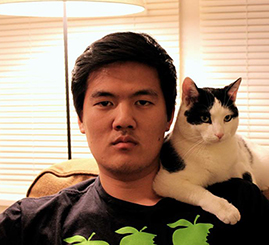When Northwestern alumna Ali Weinstein found herself with free time the Spring Quarter of her senior year, she decided to foster a dog.
Foster owners can provide temporary care for pets that are transitioning between being in shelters and being adopted. Weinstein and her foster dog, Brownie, met in April 2014. She calls the six weeks Brownie spent in her home one of the most wonderful experiences she’s had.
“The two things I was used to growing up with were children and dogs,” Weinstein says. “You can’t foster babies [in college] but you can foster dogs.”
Weinstein and her roommate found 5-year-old Brownie through Pets Are Worth Saving (PAWS), Chicago’s largest no-kill organization for homeless pets. Sometimes foster pets have behavioral issues, but Weinstein says she got lucky with her Chow Chow and German Shepherd mix.
“I constantly brought her over to my friends’ houses,” Weinstein says. “She is one of the sweetest, most people-loving dogs I’ve ever met in my life.”
Alumnus Benison Choi also uses the word “lucky” to describe his experience with an American Shorthair named Cubby. After Choi decided to foster the 5-year-old cat his senior year, he realized it was like “having another person in the house when [his] roommate was gone.”

Photo courtesy of Benison Choi.
“When [my roommate was] not there, the cat that I could play with and cuddle with was always there,” Choi says. “There are no words for the joy that it brought.”
According to Angela Love, head coordinator of dog fostering at the Evanston-based Community Animal Rescue Effort (CARE), cat fostering is popular with students because roommates can share the responsibility while experiencing a pet-and-owner relationship like the ones they have at home.
“There is a lot of stress involved with schools like Northwestern, I would imagine,” Love says. “It would be very therapeutic to come back to your room and have a kitty rubbing against your leg.”
PAWS and CARE provide all medical supplies and tools necessary. Yes, fostering is free.
“This is why student fostering is popular,” Love says. “It’s for someone who wants a pet but is not ready to make a full commitment and cannot commit financially right now. In turn, we’re asking for you to give some time and care to your animal.”
The process of fostering a dog or cat from CARE is simple. Interested owners just fill out an application and wait for an appointment call. Afterwards, CARE volunteers bring them the animal and medical supplies. CARE marketing and publicity volunteer Karey Uhler describes the match-up process as “eHarmony for pets.” The organization tries to match up owner preferences to an available pet while also considering both parties’ personality traits.
“Let’s say that you wanted a fluffy lap cat,” Uhler says. “We would look around in our database until we find an animal that matched the description and give you a call.”
At the end of his fostering term, Choi says letting go of Cubby was hard. Because he passed down the cat to current Weinberg seniors Adam Hittle and Robert Smierciak, he keeps in touch with Cubby through frequent Snapchats.
Although Weinstein and Brownie’s goodbye was equally sad, it was a little more permanent. She and her roommate were present for Brownie’s official adoption into another loving family a week before their graduation.
“I 100 percent recommend [fostering an animal],” Choi says. “I would go and deliver the cat myself to that person’s doorstep.”

